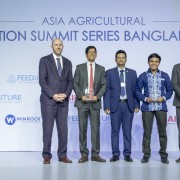Speeches Shim
In response to a request from the Ministry of Health and Family Welfare, the United States Agency for International Development (USAID) provided 622,800 doses of injectable contraceptives to the Government of Bangladesh on March 25, bringing the total contribution from the United States to nearly one million doses valued at $901,232. This latest contribution of injectable contraceptives follows an earlier donation of 292,000 doses delivered in February 2018 and three million sachets of oral rehydration solution delivered in December 2017. Since August 25, 2017, the United States Government has provided more than $110 million to assist Rohingya refugees and host communities in Bangladesh.
Today, the United States, through the U.S. Agency for International Development, announced $18.4 million to the UN World Food Program to provide emergency food assistance to Rohingya refugees in Cox’s Bazar district, Bangladesh.
On December 6, the U.S. Agency for International Development (USAID) awarded $7.5 million to the United Nations Children’s Fund (UNICEF) under the Food for Peace Act to improve the nutritional status of Rohingya refugees in Bangladesh. With this new award, the U.S. Government has provided over $90 million to assist Rohingya refugees since August 24. Over 625,000 Rohingya have fled violence in Myanmar since August 25.
Today we are pleased to announce that the United States, through the U.S. Agency for International Development (USAID), is providing an additional $6 million to the UN World Food Program (WFP) to address the Rohingya crisis in Bangladesh. This funding is in addition to the $1 million provided to WFP earlier this year. This assistance will support food distributions as well as the needed logistics to provide humanitarian assistance.

Millions of smallholder farmers in South and Southeast Asia are attempting to diversify beyond staple crops to increase their incomes, nutrition, and resilience in response to climate change and shifting market demand. Although they are potentially significant producers of fresh vegetables and farmed fish, most smallholders lack access to technologies that would help them produce the quantities and quality needed to earn income sustainably. To address this, the U.S. Agency for International Development (USAID) rolled out its new Feed the Future Asia Regional Innovative Farmers Project at the Agriculture Innovation Summit in Dhaka today. Implemented by Winrock International, the regional project will increase food security, reduce poverty, and improve environmental sustainability by facilitating agricultural innovation and technology diffusion in several countries in Asia including Bangladesh.


Comment
Make a general inquiry or suggest an improvement.